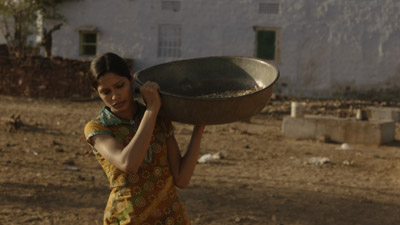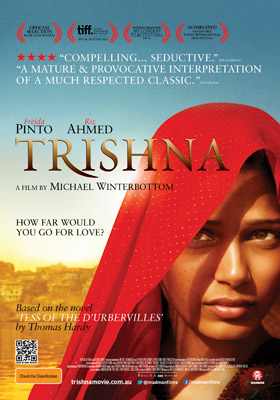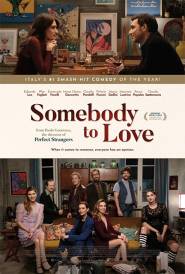Freida Pinto Trishna Interview

Freida Pinto Trishna Interview
Cast: Freida Pinto, Riz Ahmed, Kalki KoechlinDirector: Michael Winterbottom
Genre: Drama, Romance
Running Time: 117 minutes
Synopsis: From acclaimed director Michael Winterbottom comes a modern day re-telling of Thomas Hardy's classic novel "Tess of the d'Ubervilles". Starring Slumdog Millionaires' Freida Pinto, Trishna is a beautifully shot tale of love and tragedy set across modern day rural Rajasthan and the thriving metropolis of Mumbai.
Trishna (Freida Pinto) lives a poor, sheltered life until one day she meets the wealthy young Jay (Riz Ahmed), who has come back to India to work in his father's hotel business. Being the sole provider for her family since her father's accident, Trishna agrees to leave Rajasthan to work for Jay, and gradually they fall in love. Despite their feelings for each other, their relationship must remain a secret due to the conflicting pressures of a traditional society. After a dramatic event separates the two, Jay tracks Trishna down and offers her a more liberated life full of possibility in Mumbai. As time passes, the relationship begins to transform and Jay's true character emerges. Trishna soon finds herself torn between her family, a life of new freedom and the reality of her troubled relationship.
Release Date: May 10th, 2012
Interview with Freida Pinto
Question: Take us through the process of how you became involved in the project. What attracted you to it and to the role of Trishna?Freida Pinto: When I was told that Michael Winterbottom would like to meet me to discuss his new film project, I obviously jumped on the opportunity. He is one of those rare directors who makes films by boldly attempting and embracing any given genre. I was already familiar with Thomas Hardy's 19th century novel Tess of the d'Urbervilles and the idea of having it set in contemporary India was absolutely brilliant and apt. I was pining to sink my teeth into a hardcore independent project and Trishna came along.
Question: Who is Trishna?
Freida Pinto: According to our story, Trishna is the nineteen year-old daughter of a rickshaw driver. Since she's had a taste of a little education, she doesn't entirely conform or fit into the traditional mould of thinking that her parents belong to. She leaves school and works at a hotel near her hometown of Ossian in Rajasthan to bring more money into the household. She is, however, determined to ensure that her younger siblings are given a good English middle school education. That's something that she wishes she could have continued as well. She meets Jay while working at the hotel and falls in love with him and has a sometimes blissful, but mostly tumultuous relationship with him, which eventually leads us into their tragedy.
Question: Tell us about Trishna's personal journey
Freida Pinto: Trishna for me, is the epitome of purity and suffering. Her journey can be divided into the three phases within the film. The first is her mundane family life in Ossian which starts changing only after she meets Jay. An unspoken passionate tension and subtle seduction rule this phase.
The second phase is what I called "the Happy Phase" where both Jay and Trishna get temporary freedom from everything class-related, where they can just enjoy being together, uninhibited, in the city of Mumbai. They really discover each other during this time and are passionately in love. This is where Trishna, although she misses her family, is a lot more relaxed with Jay. The last phase is the most complex one of the story where Trishna has to face the inevitability of her fate with Jay and the fact that she would never be able to rise from her social class/status to be on the same level as him. In a way she would always have to submit to him in society.
However, in their private moments while the love still exists, it slowly turns into sadistic torture especially for Trishna, which she swallows as a bitter pill. Finally, she is pushed over the edge and that's when she decides she cannot take it anymore.
Trishna is constantly torn between her desire to adopt Jay's modernism and urbanity - which to some extent she does, and the traditional family values and rural roots that she finds hard to ignore. Therein lies her conflict. She does find it very liberating when Jay comes back looking for her and takes her to Mumbai. But there's a certain sadness in the fact that she never fully fits into that setting but is nonetheless happy to try. When Jay finally takes her back to Rajasthan after finding out that she has been hiding a secret from him, she is in a way made to accept the unfairness that she has always been subjected to. To sum up her journey throughout the film in short, she's almost there but never really there.
Question: Tell us about her relationship with Jay.
Freida Pinto: Jay in our film is the embodiment of both Angel and Alec in Hardy's novel. Trishna's purity is alluring to Jay but it's that very quality he ends up exploiting in his Alec phase. It's a very passionate relationship filled with sexual tension, awe and a certain admiration for each other. But they are almost like each other's forbidden fruit. Trishna would probably only dream of falling in love with someone like Jay and only in her wildest dreams would she ever imagine it to be a reciprocal feeling. There is a lot of shyness and passivity in the way she handles her side of the relationship with him never knowing how much she could actually open up. So when she finally does tell him about the pregnancy, his image of her being a symbol of "ultimate purity" comes down like a house of cards and they move into a very sadistic phase of their relationship where she continues to be even more passive which irks Jay further and in turn he keeps provoking her to get her to react. It's a doomed romance.
Question: How different was the shooting experience and working with Michael, compared to your other films?
Freida Pinto: Michael has a very distinctive style of filming. He is not afraid of getting his hands dirty in a way that he can be fully involved in the story and encourages and expects us to do the same. He also has an optimism that is absolutely admirable but also quite intense. He knew I didn't speak Marvadi at all but somehow thought since I spoke Hindi I would be able to speak and improvise in Marvadi as well. It obviously scared the living delights out of me and forced me to find a method to pick up the language in less than 20 days! I didn't have a dialect coach on set so I had to prepare myself fully for whatever could be thrown at me. I think in that sense, he expected our homework to be thorough and for us to be as prepared as he always is. That quality made me think a lot more independently as an actor and to be able to make the set more organic rather than contrived. He likes working with a very intimate set - very few people where you don't feel like it's a movie set. He is very flexible and invites the actors to come up with their own ideas to enhance the scenes. Every film has had its own unique and wonderful experience but this is what is unique about Michael.
Question: What sort of preparation and research did you do and what other skills did you have to learn? You do a lot of dancing?
Freida Pinto: Oh yes - the dancing! I accompanied one of the crew members on a recce a month before we started filming to get a better sense of the culture I was going to dive into. It's obviously not enough to just be an Indian to play this character. Rajasthan is vastly different from Mumbai. I met a lot of families, young girls working at hotels, recorded videos and audio tapes, went to local schools, spoke to students there and got interesting insights on their dreams and aspirations and the hurdles they come across in accomplishing those dreams. For me, my research consisted of studying people. I was not playing Tess in England or Mumbai, so I had to keep it as authentic to the Rajasthani setting as possible. In terms of skills, I learnt to speak a bit of Marvadi and of course learning the traditional Rajasthani dance moves was fun. Can milking cows and goats also be considered a skill? I think yes!
 Question: The role of Trishna is huge and required flexibility and versatility, which you excelled at. What were the biggest challenges and biggest joys of the shoot?
Question: The role of Trishna is huge and required flexibility and versatility, which you excelled at. What were the biggest challenges and biggest joys of the shoot?Freida Pinto: It has been by far my biggest and most demanding role and I couldn't have enjoyed it more. The biggest challenge was adopting Trishna's passivity which is not necessarily her strength or weakness, it is both. Many times Michael had to remind me during certain scenes not to respond and join in every conversation but rather be the observer and absorber. That's very difficult for a chatty girl like me who is always ready with a response! But through the course of the filming process it started falling into place - the frustration, the internalisation of the pain she feels that ultimately pushes her over the edge. For me it was almost like her passivity was a must to understanding her suffering. Working with a team that introduced a guerilla style of filmmaking to me was a complete joy and I cannot say I wasn't ready for it. I was more than happy to embrace it. The simplicity of our living conditions in Ossian made it easier for me to feel closer to Trishna. I found it very interesting that we didn't just work with professional actors. The family playing Trishna's family in the film were a real Rajasthani family from Ossian (except for those playing my mother and father). It was like the saying "go with the flow" for most part but with an obvious direction.
Question: How was it working with Riz?
Freida Pinto: There is something absolutely earthy and raw about the way he performs. He takes every moment as it is given to him he feels it inside out and delivers with impact. He can be very hard on himself sometimes but that's the way he functions. I believe that's his way of pushing himself to do better and excel. His ability to communicate his ideas and at the same time be open to debate made it very easy and a memorable experience.
Question: Michael has compared the England of the 19th Century during Tess' time with the new India that's emerging (industrialization, urbanization, education). Do you agree? How have you seen India change in recent years and how in particular, has it changed for women like Trishna?
Freida Pinto: It is quite true and I never really paid attention to that comparison, till I had to justify to myself why Trishna would be the perfect Indian Rajasthani adaptation. It definitely is. India has changed in a lot of ways and in some ways there is still the need for more change. Education is slowly trickling into most remote villages of India and the importance of educating the girl-child is also coming to the forefront. There are still a few rigid ways and blind faith beliefs, social class system and casteism - that serve as hindrances in a few small towns and villages in the interiors of the country but despite that conscious efforts are being made to ensure that the need for basic education to children - male and female is met and adequate support to see it through is provided for. The Thar English Medium Primary School in Ossian that lent their support in the pre-production process of the film is one such example of the educational change in rural areas.
As far as cities like Mumbai, Delhi, Bangalore etc go, there is an incredibly distinctive change. Technology and modernisation has improved the quality of life, and education has become on a par with the international standards if not better. The manner in which India's economy has seen an unprecedented boom in the last one and half decades and particularly in the last four to five years has a lot in common to the industrial revolution of England.
There is also considerable growth and development of "home grown MNCs" in India. Besides the open door policy that allows foreign investment in India, we also have our own corporate giants like the Tata group, the Birla group, the Ambani group that have made a mark in the business and entertainment world not just in India but also overseas.
And of course as far as changing role of woman in society goes, the fact that the current President of India is a woman is quite a shining example.
Question: Trishna's journey is portrayed in a very raw way. How did it feel to play that? How emotional was it?
Freida Pinto: It was very challenging but liberating. Michael did not tamper with or clean up the natural setting to make it seem conventionally perfect. It was easier to play with everything that I was surrounded by. That also helped me immerse myself in my character for the 9 to 11 hour filming days without feeling the need to let myself get in the way. Mistakes were the best part of the filming process. They were not corrected and fixed every second of the day. The fact that the camera never stopped rolling and we never had a script was my favourite part. I had to live every minute of the scene as my character. At times, a lot of things we would say were so real and this is where you think about how much life's experiences prove beneficial in films like these. It was exhausting and draining at times but became kind of like an addiction to push one step further to see what else could possibly be in store. In that sense it was definitely an emotional journey as it did require every thinking, feeling muscle to be engaged while performing.
Question: Trishna is more complex than Jay gives her credit for. What finally pushes her over the edge?
Freida Pinto: As far as I'm concerned, unfortunately what drives the entire relationship over the edge is Jay and Trishna's inability to understand each other's complexities in the first place and address them. But a problem lies within that very thought as Trishna's shyness and passivity almost makes it impossible for her to partake in a confrontation. The vast difference between the social classes that Jay and Trishna come from also contributes to the breakdown of their relationship as they share very little in common. Trishna finds a beautiful new life with Jay in her Mumbai days and for fear of losing it and his love, she hides the fact that she was once pregnant with his child and underwent an abortion. She obviously came from a place where her family's decision to end the pregnancy was final and one that she had to agree to as she would disgrace her entire family otherwise. It's much like how Hardy's Tess, talks about sexual double standards wherein a girl losing her virginity before marriage was frowned upon by society.
Jay's reaction to her secret is too harsh for Trishna but she takes it upon herself as something she must live with, that she must endure some more suffering. However, this also makes her retreat further into her shell and become more passive. So in the final Nagaur phase, there is an almost stubborn and egoistic battle between the two of them. She craves for the Angel in Jay to be revived but the setting/circumstances in which they live in now almost reduces her to more of a concubine than the lover. So while she suffers and he becomes increasingly aggressive in the way he treats her, their relationship degenerates into something almost vile. Finally, Jay's demeaning act towards her momentarily changes something in Trishna. She's can't take it anymore and she is overtaken by a silent but murderous rage and kills him. I viewed this as the killing of Alec in Jay rather than Angel but the way our story is woven means she loses Jay entirely.
Question: Michael has drawn similarities between Thomas Hardy's storytelling and Bollywood films (melodrama, love, poor girl falling in love with rich man). Can you see that?
Freida Pinto: Absolutely. Essentially it can be viewed as a typical Bollywood story - the themes and the definite melodrama in it. Even some of Hardy's lines can find a direct parallel to some of the Bollywood films, especially when Angel returns from Brazil to find her as a mistress to Alec and Tess tells him "It's too late, it's too late". It's reality that's heightened with tools like melodrama.
MORE





